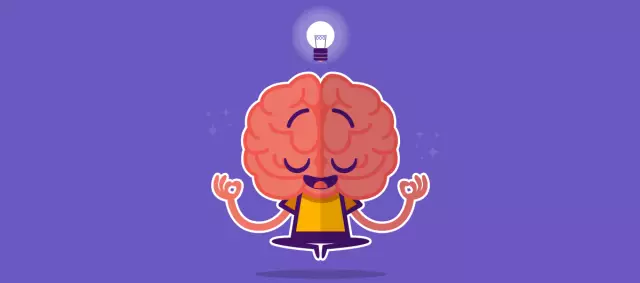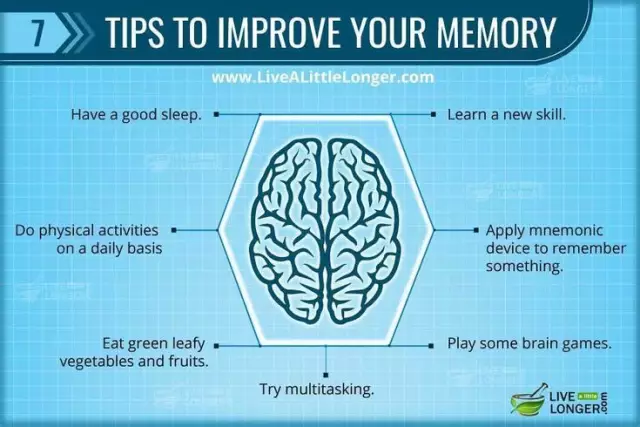- Author Rachel Wainwright wainwright@abchealthonline.com.
- Public 2023-12-15 07:39.
- Last modified 2025-11-02 20:14.
How to improve and preserve memory
Memory is the ability of the central nervous system to record, store and, if necessary, reproduce information about objects, skills, etc., received by a person or animal during life. The mechanism of this process is not fully understood.

Source: depositphotos.com
Initially (from birth), people's ability to memorize is not the same, but, as a rule, memory weakens with age, which creates serious interference in professional activities and reduces the quality of life. Therefore, the knowledge of how to strengthen memory is necessary for every person.
Types of memory
Scientists distinguish between short-term (primary) and long-term memory. The first allows you to reproduce the received data in a maximum of several minutes after receiving them. The capacity of short-term memory does not exceed nine objects (randomly located numbers, unrelated words, etc.). Primary memory is easily destroyed by stimuli such as hypothermia, hypnosis, or electric shock. Some scientists believe that only information encoded in words is stored in short-term memory. Data that cannot be reproduced verbally goes directly to long-term memory, also called secondary memory. Its volume is much larger, and the storage time of information is practically unlimited (from several minutes to decades). Secondary memory cannot be destroyed by external influences.
In addition, the types of memory differ depending on the way information is obtained:
- figurative. This type is typical for children. It reaches the optimal level by the age of 8-11, then it practically does not change with age;
- verbal (verbal-logical). It develops by the age of 16, persists until about 35, and then begins to weaken;
- sensory. This type of memory arises when stimuli affect the sense organs. Distinguish between iconic (visual), echoic (auditory), tactile (tactile) and olfactory memory;
- emotional;
- motor, associated with memorizing repetitive movements (for example, writing, walking, movements related to professional skills).
Different people have different types of memory. Experts say that heredity plays a significant role in this. In addition, the state of memory is largely determined by the state of health, the person's age and lifestyle.
How to optimize the process of memorization and not let your memory weaken?
Scientists argue that the ease and speed of recording information, as well as the accuracy of its subsequent reproduction, are determined by the implementation of the following rules (laws):
- the law of comprehension. Data that is analyzed and systematized are easier to remember and remember;
- the law of interest. It is easier to record the information that arouses personal interest in a person;
- the law of installation. People easily capture data if they want to remember it;
- the law of context. Information that in a certain way correlates with the existing one is stored in memory more fully;
- the law of action. The data are well remembered in the process of their practical application;
- the law of repetition. What has often been reproduced is better held in the head;
- optimal length law. The least effort is needed to memorize information, the size of which does not exceed the volume of short-term memory;
- edge law. The person most clearly remembers the data that at the time of receipt was at the beginning or at the end of the block of information;
- the law of incompleteness. The memory retains actions or events that have not been fully completed (unsaid phrases, tasks that could not be solved, etc.);
- the law of inhibition. When fixing data that is similar in content, the memory stores newer information, overlapping the obsolete one.
Knowing these rules makes it easier to store the necessary information, but will not help in cases where memory is weakened due to a person's age or poor health. To avoid this kind of trouble, you need:
- observe a sleep and wakefulness schedule. It has been found that people who are constantly sleep deprived, very quickly have problems remembering and reproducing information;
- optimize the diet by including the maximum amount of foods that have a beneficial effect on mental activity. These are fatty fish, nuts and seeds, leafy vegetables, unpolished cereals and sprouted grains, broccoli, blueberries, black currants, tomatoes, garlic;
- introduce teas from medicinal plants (sage, elecampane, red rowan, clover) into use;
- set aside a few hours a day for sports and walks in the fresh air.
Memory is better preserved in people who live in this mode all the time. The sooner a person begins to properly relate to his health, the higher the likelihood that he will not have problems with memorizing and reproducing information.

Source: depositphotos.com
A number of drugs have a positive effect on memory that has been weakened by illness or age-related changes. You cannot choose such funds yourself. They should be prescribed by a doctor, based not only on the patient's complaints, but also on the results of the examination, the presence of chronic ailments and many other factors.
Problems with memorizing information are not solved only by choosing a healthy lifestyle and taking medications recommended by the doctor: you need to train your memory. For a long time, it was believed that the best way is to memorize poetry or solve crosswords. Modern research has shown that this is not entirely true. There is nothing wrong with the knowledge of poetry or a broad outlook, but in order to maintain memory in working order, it is necessary that the information that a person receives and accumulates is not of the same type. The memorization mechanism works best in those cases when people periodically change their interests or significantly expand them, gaining knowledge from related fields. In addition, it is very important that during the training process the laws of action, interest and attitudes are observed. In practice, this meansthat obtaining new information should have some specific purpose. For example, it makes sense to master a foreign language with your child, helping him, or to study the principles of floriculture, while growing indoor or garden plants.
The process of strengthening memory is closely related to the development of fine motor skills. Contrary to popular belief, this is important not only for young children, but also for their parents and grandparents. Scientists note that people who are engaged in needlework rarely suffer from memory impairments, so such hobbies are very useful at any age.
The link between a good memory state and an optimistic outlook on life has not been clinically proven, but it is known that the ability to analyze and record information is very badly affected by stress. No one has yet been able to completely avoid anxious and traumatic situations, but the ability to cope with them without feeling discouraged is undoubtedly beneficial for physical and mental health. In any case, benevolence, patience and the ability to see the beauty of the world will not be superfluous when solving the problem of preserving memory.
YouTube video related to the article:

Maria Kulkes Medical journalist About the author
Education: First Moscow State Medical University named after I. M. Sechenov, specialty "General Medicine".
Found a mistake in the text? Select it and press Ctrl + Enter.






